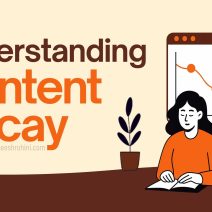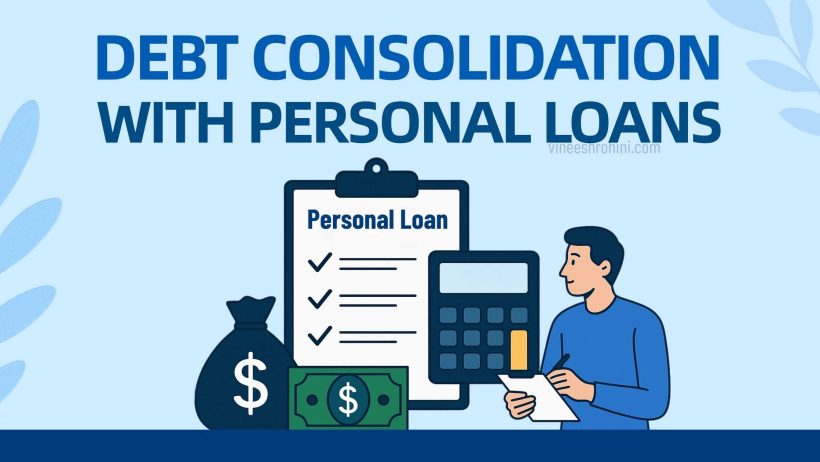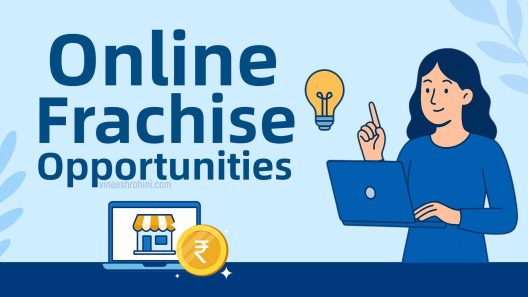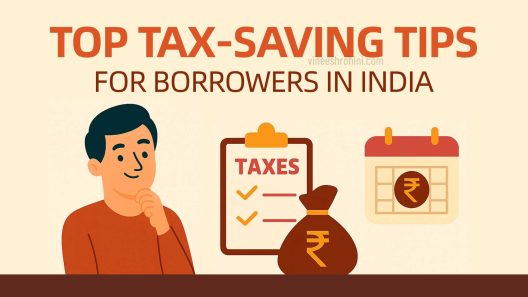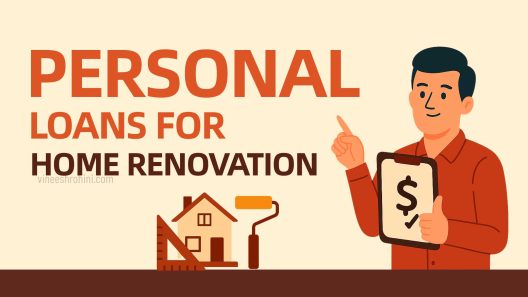Debt Consolidation : Debt has become an inseparable part of modern financial life. Whether it is credit cards, personal loans, consumer durable loans, medical expenses, or buy-now-pay-later schemes, most individuals carry multiple forms of debt at once. While borrowing can be a helpful tool when managed well, the challenge begins when repayment obligations pile up across different accounts with varying interest rates and due dates. Many borrowers find themselves struggling with financial stress, missed payments, and rising penalties. This is where the concept of debt consolidation using personal loans comes in. It promises a way to simplify repayment, reduce costs, and restore financial control. But is this solution always smart, or can it sometimes be risky?
Table of Contents
In this comprehensive guide, we will dive deep into the mechanics of debt consolidation with personal loans, the benefits and risks, the scenarios in which it works best, and the mistakes borrowers must avoid. By the end, you’ll have a complete understanding of whether debt consolidation is the right financial strategy for you in 2025.
What is Debt Consolidation?
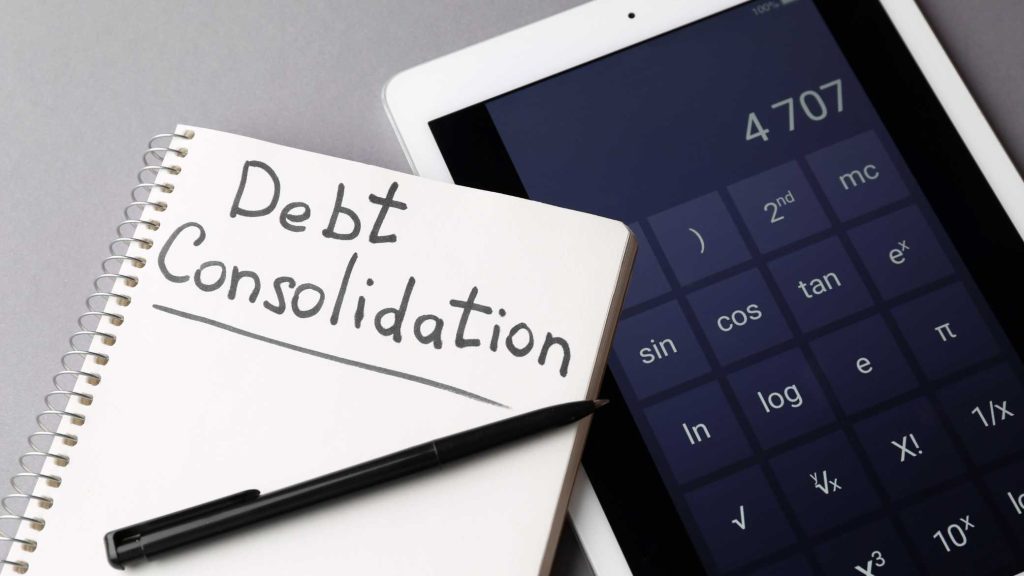
Debt consolidation is the process of merging multiple debts into a single loan. Instead of paying several EMIs with different interest rates, due dates, and lenders, you take one larger loan and use it to repay all your existing loans. After consolidation, you are left with a single EMI that is easier to track and manage.
For example:
- Credit Card 1: ₹60,000 outstanding @ 36% annual interest
- Credit Card 2: ₹40,000 outstanding @ 42% annual interest
- Personal Loan: ₹1,00,000 outstanding @ 18% annual interest
- Consumer Durable Loan: ₹50,000 outstanding @ 20% annual interest
Total debt = ₹2,50,000, with a weighted average interest rate of around 28–30%.
If you take a new personal loan of ₹2,50,000 at 14% interest, you can clear all the above debts and then only need to repay one EMI at a lower rate. This way, you simplify your financial obligations while saving on interest costs.
Also Read : Tax Benefits on Personal Loans – Truth or Myth ? : A Comprehensive Guide 2025
Why Personal Loans Are Popular for Debt Consolidation
There are multiple ways to consolidate debt—such as balance transfer credit cards, home equity loans, gold loans, or loan against property. However, personal loans stand out as the most accessible and widely used tool for debt consolidation, especially in India. Here’s why:
- Unsecured Borrowing – You don’t need collateral like property, gold, or investments to get a personal loan.
- Quick Approvals – Many banks and fintech platforms offer instant approvals and same-day disbursal.
- Fixed EMIs – Unlike revolving credit card bills, personal loans have structured EMIs, making repayment more predictable.
- Flexible Tenure Options – Tenures usually range from 12 to 60 months, allowing you to choose based on affordability.
- Digital Accessibility – Most lenders now allow online applications with minimal paperwork, making it easier for borrowers in 2025.
Benefits of Debt Consolidation with Personal Loans
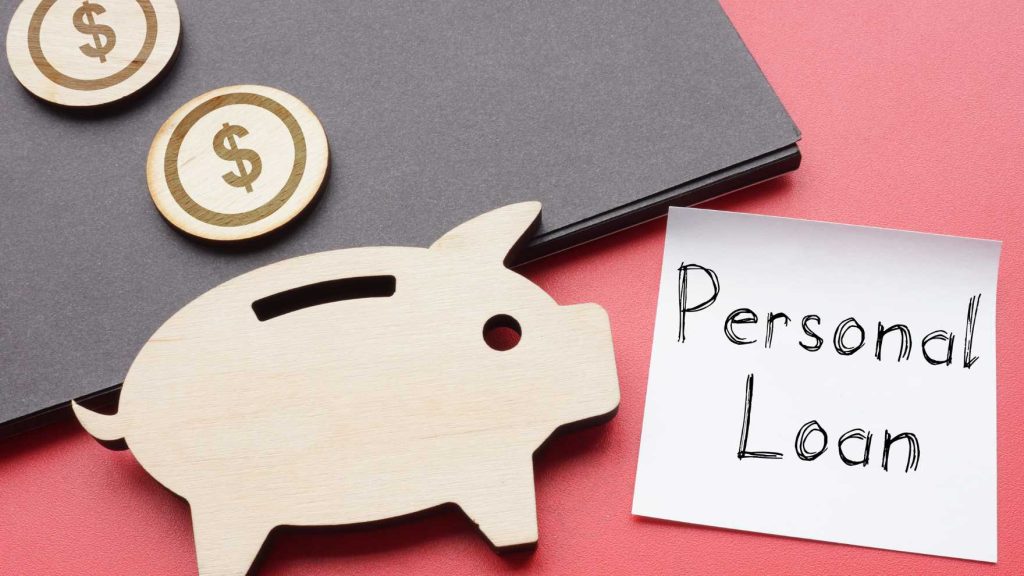
Debt consolidation is appealing because of the tangible benefits it offers when used wisely.
1. Lower Interest Rates
High-interest debts like credit cards often charge up to 36–42% annually. By consolidating with a personal loan at 11–18%, you can drastically cut interest expenses.
2. Simplified Finances
Managing multiple EMIs often leads to confusion and missed payments. A single EMI reduces complexity and improves financial discipline.
3. Improved Credit Score
Once your outstanding dues are cleared and you make timely EMI payments on your personal loan, your credit utilization ratio falls and your repayment history improves—both of which boost your credit score.
4. Peace of Mind
Financial stress is often as much emotional as it is numerical. Debt consolidation reduces anxiety by giving you a clear repayment roadmap.
5. Faster Path to Debt Freedom
Some borrowers use consolidation to shorten tenure and aggressively clear debt, while others prefer longer tenure for lower EMIs. Either way, it provides a structured pathway to becoming debt-free.
Risks of Debt Consolidation with Personal Loans
While the benefits are appealing, debt consolidation can also be risky if not handled responsibly.
1. Possibility of Paying More in the Long Run
If you opt for a longer loan tenure, even with a lower interest rate, you may end up paying more overall interest than your current debt.
2. High Processing Fees and Charges
Personal loans usually come with 1–3% processing fees, documentation charges, and sometimes prepayment penalties. These reduce your actual savings.
3. Risk of Rebuilding Debt
Many people consolidate their credit card debt, feel relieved, and then start using their cards again. This leads to a cycle of accumulating even more debt than before.
4. Rejection or Higher Interest for Low CIBIL Scores
If your credit score is below 650, lenders may either reject your personal loan application or charge high interest rates, making consolidation less useful.
5. One Big EMI Default Risk
If you miss the EMI on your new consolidation loan, the impact on your credit report can be much worse, since it represents a larger chunk of your outstanding debt.
Real-Life Example: How Debt Consolidation Can Save Money
Let’s assume:
- You have ₹1,00,000 on credit card debt at 36% interest → ₹36,000 interest/year
- You have ₹50,000 personal loan at 18% interest → ₹9,000 interest/year
- You have ₹50,000 consumer loan at 20% interest → ₹10,000 interest/year
Total = ₹2,00,000 debt with ~27% blended interest → ₹55,000/year in interest payments.
Now, you take a personal loan of ₹2,00,000 at 14% for 3 years. Your total annual interest = ~₹28,000.
Savings = ₹27,000 every year, plus simplified repayment.
When Debt Consolidation is a Smart Strategy

Debt consolidation using personal loans can be highly effective if:
- Your major debt is credit card dues at very high interest.
- You have a stable income stream that allows you to make EMIs consistently.
- Your CIBIL score is good (700+) and you can qualify for lower personal loan interest rates.
- You are committed to financial discipline and will avoid adding new debts while repaying the consolidation loan.
When Debt Consolidation Might Be Risky
Consolidation can backfire if:
- Your income is unstable and you may miss EMIs.
- You take a long tenure loan that increases your overall repayment burden.
- You continue to spend recklessly even after consolidation.
- You ignore hidden fees and end up paying more than expected.
Steps to Consolidate Debt Effectively
- Calculate Current Debt and Interest – Know your exact obligations.
- Compare Loan Offers – Use online comparison platforms to check the best interest rates and tenures.
- Check Fees – Factor in processing charges and prepayment penalties.
- Plan Your Budget – Choose an EMI you can afford without straining finances.
- Close Old Accounts Properly – Repay and get closure letters from lenders.
- Track Repayments Digitally – Use apps or auto-debit mandates to stay on track.
The Role of Fintech in 2025
Fintech platforms like KreditBee, MoneyTap, and PaySense are making debt consolidation easier. Borrowers can:
- Get instant CIBIL score checks.
- Access AI-driven loan recommendations.
- Track all EMIs in one dashboard.
- Avail pre-approved offers without paperwork.
This has made personal loan consolidation more convenient and transparent.
Buy Now : PLR Passive Income Stream
Frequently Asked Questions (FAQs)
1. Does debt consolidation hurt my credit score?
Initially, applying for a personal loan may create a small dip due to the hard inquiry. But in the long run, if you repay on time, your credit score improves.
2. What interest rate should I look for in a consolidation loan?
Anything below 16% is generally beneficial if you are consolidating credit card debt.
3. Can I consolidate my debts with a poor credit score?
Yes, but the interest rates may be higher. Alternatives like secured loans or credit counseling may be better.
4. Is balance transfer better than a personal loan for consolidation?
Balance transfers can work for short-term relief but usually have hidden fees. Personal loans provide structured repayment over the long term.
5. Can I prepay my consolidation loan?
Yes, but check if your lender charges prepayment penalties before deciding.
Conclusion
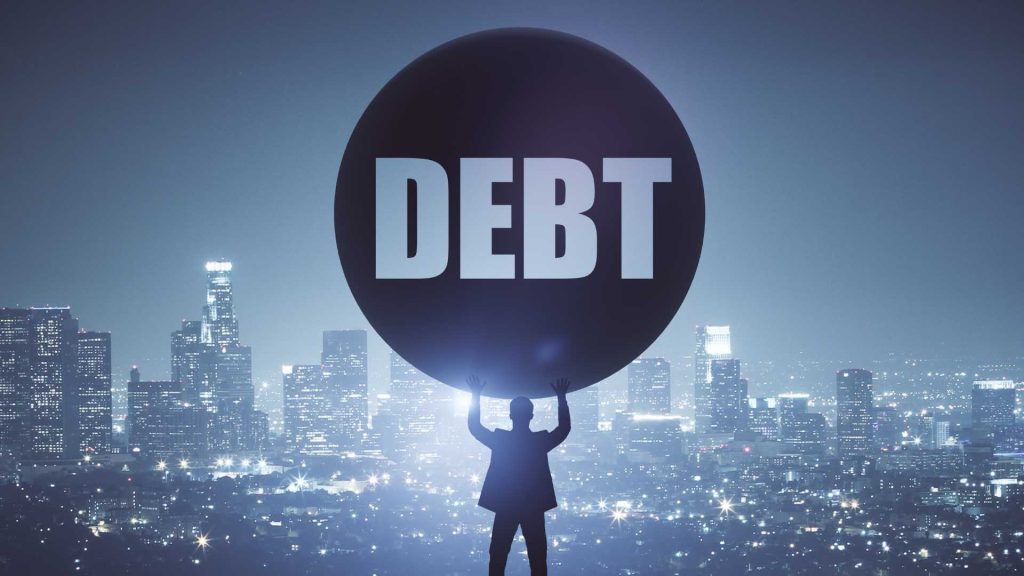
Debt consolidation with personal loans can be a smart financial strategy when used by disciplined borrowers with stable incomes. It simplifies repayment, reduces interest, and improves credit scores. However, it is not a magical fix. If you continue overspending, ignore fees, or stretch the loan tenure too long, consolidation can turn into a risky move that worsens your financial health.
Buy Now : Forever Internet Profits Blue Print
The bottom line: Debt consolidation is a tool, not a solution. It works best when combined with financial discipline, budgeting, and the clear goal of becoming debt-free.
Disclaimer
This blog is for educational purposes only and does not constitute financial advice. Interest rates, charges, and loan eligibility vary across banks, NBFCs, and fintech lenders. Readers should conduct their own research and consult with a financial advisor before making any borrowing decisions.


